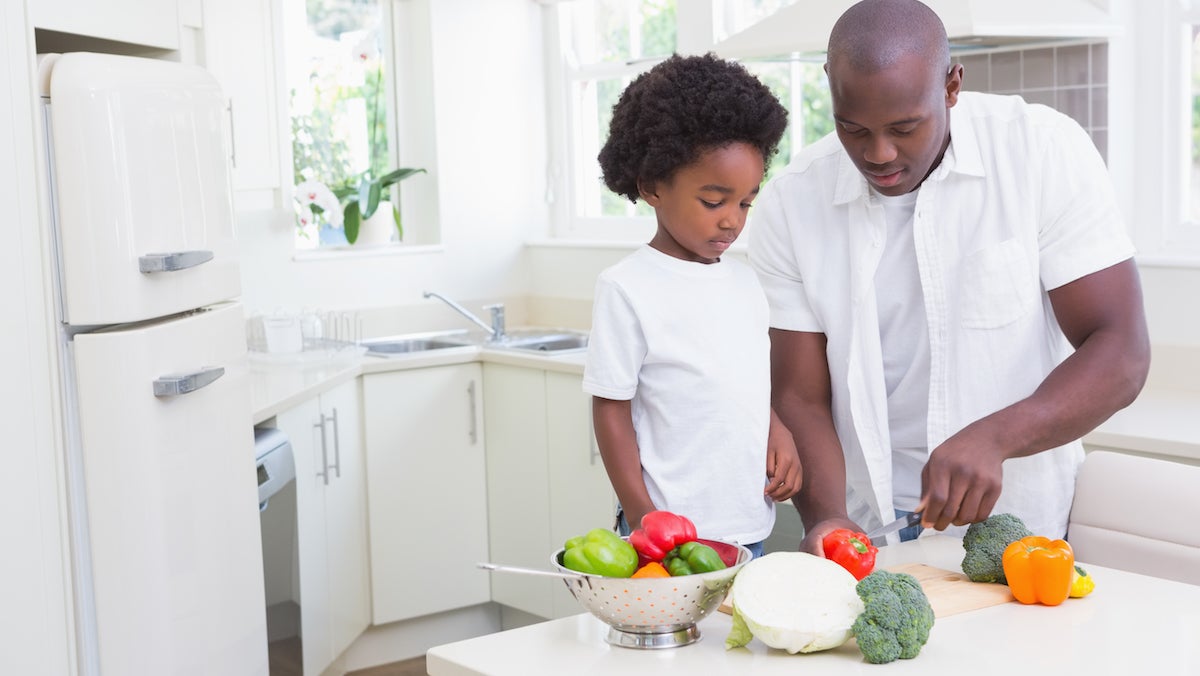Cooking with kids on and off the autism spectrum
 Parent and child cooking together photo via ShutterStock) " title="shutterstock_296935187" width="1" height="1" fetchpriority="high" />
Parent and child cooking together photo via ShutterStock) " title="shutterstock_296935187" width="1" height="1" fetchpriority="high" />
(<a href="http://www.shutterstock.com/pic-296935187/stock-photo-little-boy-cooking-with-his-father-in-the-kitchen.html?src=YLRrq6zRteVY4ognpubuPA-1-13">Parent and child cooking together photo</a> via ShutterStock)
The other morning, my 10-year-old daughter, June, announced that she no longer likes to eat apple peels and would prefer that it be removed.
My first reaction: “Are you freaking kidding me?”
But then I regrouped, brought her into the kitchen and gave her a two-minute lesson on peeling appels. She liked holding the peeler and caught on quick. In fact, peeled apples have become her new snack of choice over the crunchy things that come in bags from the snack aisle waiting her for in our pantry.
Both of my kids (June and her older brother George, age 12) have grown up getting comfortable in the kitchen with me. We first started cooking regularly with George, who has autism, when he was four as part of a therapeutic program to help him build focus skills, work on sensory integration, communication and most importantly, social connection between us. At that time, he couldn’t focus on doing anything for more than a minute or two. Cooking began to hold his attention.
I developed kid-friendly recipes for him and developed ways to have fun making simple, healthy snacks and treats with George and June (who was just 18 months old) together. Those recipes became the foundation for my visual children’s cookbook, The Kitchen Classroom, which comes with a parent/teacher guide and step-by-step visual recipes for children of all ages and abilities to follow.
Over the years, I’ve written many articles and blogs about cooking, led workshops for educators and cooking sessions for parents and kids. There are a few essential takeaways about cooking with your kids that I’ve discovered over the years:
There’s no camera watching I’m a “Chopped” addict and I love to read beautiful food blogs, but the pictures that I share of the food my kids and I make together don’t look like a food stylist has been helping us. Nothing needs to be perfect — a little bit burnt is good enough. Preparing food has become a form of entertainment, and I encourage parents to leave the competitive mindset behind. Have fun with your kids. Experiment. The recipe won’t always turn out perfectly — and that’s just fine. I was doing a demo with parents of a recipe that requires pouring liquids and breaking eggs. A horrified mom asked, “What happens if something spills?” You clean it up. It’s OK! (And actually, you can teach your kids how to help clean up).
Cooking is more fun than homework That’s my opinion, anyway. Whether your kids are in preschool, elementary, middle or high school, cooking can help them work on important skills including math, science, reading and language. For children in special education, cooking offers a concrete way to count, learn sequencing and develop fine and gross motor skills. The Kitchen Classroom offers some tips on how to use cooking time to support developmental skills.
Doesn’t need to be every day We’re all busy parents, juggling so many demands. Some days dinner needs to be take-out or something that you defrost from the freezer — that’s how it is in my house. But if you set an intention that say, once a week or for special holidays, you’ll set aside time to bring your kids into the cooking process, you’ll see so many rewards. I have seen how children come to value and respect where food comes from when they get to be part of the cooking process. Sometimes picky eaters are more eager to try new things. I have seen children who get excited to go to the grocery store or farmer’s market because they want to try new recipes.
How and when do you cook with kids? I’d love to hear your questions about cooking with kids of all ages and abilities.
WHYY is your source for fact-based, in-depth journalism and information. As a nonprofit organization, we rely on financial support from readers like you. Please give today.

